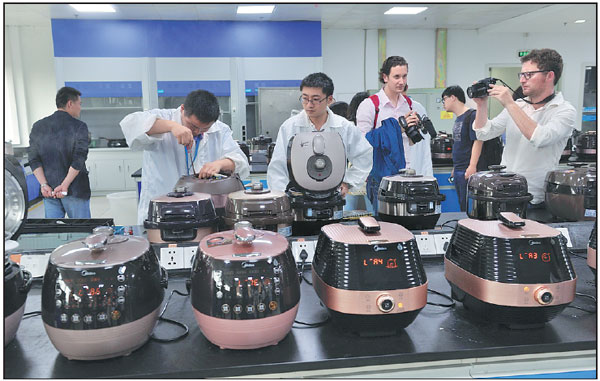Midea's global strategy pays off

Appliance giant shifting focus to growth driven by technology
Midea Group Co is looking to reap the benefits from its global strategy as it seeks to transform from a traditional household appliance giant into a heavyweight technology company.
According to company officials, Midea is looking to bolster its overall competitiveness by shifting to technology-driven growth.
In 2012, the Foshan, Guangdong-based company realized that its original pattern of scale-oriented development, that is, to compete with lower costs for bigger market share, was unsustainable.
The fundamental way out for the manufacturing industry was to promote industrial upgrade through technological advancement, according to Paul Fang, the group's chairman and CEO.
"We believe the society is moving towards an era of optimal human-machine interaction, and what Midea has to do now is to constantly stay ahead," said Fang.
"Midea is equipped with state-of-the-art technology that will facilitate breakthroughs in artificial intelligence and next-generation manufacturing in the digital era."
To fulfill the technological vision, Midea has been implementing international strategies like industrial chain layout and scientific research deployment.
The firm expanded its product mix by acquiring companies overseas, such as Toshiba Corp's home appliance unit and Italian air-conditioner maker Clivet SpA.
In addition, it also entered industrial robot manufacturing by purchasing German robot maker Kuka AG and Israeli automation solution provider Servotronix.
"Thanks to Kuka's expertise in robotics and automation, Midea would be able to usher in a new era of manufacturing intelligent machines and smart factories," said Wang Shuwei, an analyst with Essence Securities Co.
"It would accelerate the company's pace of shifting towards a technology-driven firm."

Technicians testing Midea products at a quality inspection center in Foshan, Guangdong province. The company reported revenue of $18.8 billion in the first six months of the year and has more than 20 R&D centers around the world. [Photo by Yu Ge / For China Daily]
The deployment of research and development centers worldwide also illustrated Midea's commitment to localize product offerings for international markets.
Last year alone, the company founded two new R&D centers in the United States, one in Louisville and one in Silicon Valley, as well as an innovation center in Europe.
Take the Silicon Valley-based Emerging Technology Center for example. Midea allocates resources to cutting-edge technologies like artificial intelligence, microchips, sensors, and smart robots.
Till date, Midea has established more than 20 R&D centers all over the world. The company's investment in R&D over the past five years exceeded $3 billion.
Midea is among a number of Chinese household appliance firms that are also seeking new drivers of growth in disruptive technologies.
For instance, Haier Group, one of Midea's Chinese rivals, has ramped up efforts to set up interconnected factories abroad, a move to turn itself into an intelligent producer in the internet age.
Jiang Feng, director of China Household Electrical Appliance Association, said: "Household appliance companies need to put more emphasis on investing in research and development, and further capitalize on innovative technologies."
"By doing so, they can enter into a development stage fueled by innovation and efficiency."
During the first six months of this year, Midea reported revenue of 124.45 billion yuan ($18.8 billion), a year-on-year increase of 61 percent. Revenue generated from the overseas markets amounted to 55.46 billion yuan, up 77 percent year-on-year.
jingshuiyu@chinadaily.com.cn
MOST POPULAR
- 1 $39.7 billion worth of deals inked at Airshow China
- 2 China announces tax relief measures to stabilize real estate sector
- 3 A look at China's economy in October, 2024
- 4 Public holiday extension announced
- 5 China's NEV annual production hits 10 million milestone amid global carbon reduction efforts
Editors' Picks
 Infographic:
A look at China's economy in October, 2024
Infographic:
A look at China's economy in October, 2024
 Infographic:
G20 at a glance
Infographic:
G20 at a glance
 Video:
Peru sees new port open
Video:
Peru sees new port open
 Infographic:
China's public holidays for 2025
Infographic:
China's public holidays for 2025
 Infographic:
Basic facts of APEC
Infographic:
Basic facts of APEC


